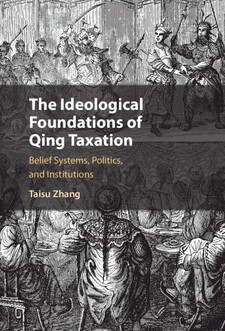Professor Zhang Traces How Ideology Shaped Early Modern China

In his new book, The Ideological Foundations of Qing Taxation: Belief Systems, Politics, and Institutions (Cambridge University Press, 2023), Professor of Law Taisu Zhang ’08 addresses “perhaps the central question in modern Chinese history”: why did China enter the 20th century weaker than Japan and Europe? Zhang’s book, the second volume of a planned trilogy, argues that the beliefs held by policymakers played a critical role.

When trying to understand China’s divergence from other early modern states, scholars focus on China’s last imperial dynasty, the Qing, which held power from 1644 to 1912. Zhang traces how a philosophy that paired Confucian ethics with realist concerns shaped 268 years of Qing taxation policy — and left China without the military or financial means that would propel its counterparts to dominance.
A lawyer and comparative legal and economic historian, Zhang draws upon ideology as an analytical lens. The Ideological Foundations of Qing Taxation recognizes that longstanding — and, frequently, Eurocentric — narratives about Chinese history have overemphasized this concept, chalking up China’s “weakness” to the Qing dynasty’s supposedly rigid doctrines. Rather than depict early modern China with broad brushstrokes, Zhang unearths the “political and intellectual idiosyncrasies” that characterized Qing rule. He situates ideology as one historical force that interacted with others, including class structure and market volatility.

Zhang uses the example of agricultural taxation to illustrate how ideology drove Qing policymaking. Relative to previous Chinese dynasties and other early modern states, the Qing dynasty levied few taxes on agrarian production, the bulk of its economic activity. Whereas the Qing raised other taxes (such as salt excises and tariffs), the dynasty rarely altered agricultural rates — despite mounting crises that called for higher state revenue. Though economic historians have explored this phenomenon, Zhang writes that only ideology can explain why Qing elites seemed to act against their own self-interest.
The Ideological Foundations of Qing Taxation raises profound questions about the interplay of ideology, culture, and law. Engaging with previous scholarly work, including that of Knight Professor of Constitutional Law and the First Amendment Jack M. Balkin, Zhang notes that ideology is both empirical and normative — “how” someone implements an ideology may differ from “what” that ideology entails. By describing the Qing taxation system as ideological in nature, Zhang does not pass judgment on whether his subjects were “right” or “wrong.” Rather, his work examines how doctrine molds legal history, particularly as it pertains to China’s emergence into the modern era.
Taisu Zhang, Professor of Law at Yale Law School, holds a dual appointment as a Professor of History at Yale University. In addition to The Ideological Foundations of Qing Taxation, Zhang is the author of The Laws and Economics of Confucianism: Kinship and Property in Preindustrial China and England, the trilogy’s first volume. The recipient of the 2018 Presidents Award from the Social Science History Association and the 2018 Gaddis Smith Book Prize from the MacMillan Center for International and Area Studies, he serves as co-editor of Studies in Legal History. Zhang has previously taught at Duke University School of Law, the University of Hong Kong, Brown University, and Tsinghua University School of Law. He is a member of Peking University Law School’s Global Faculty.


